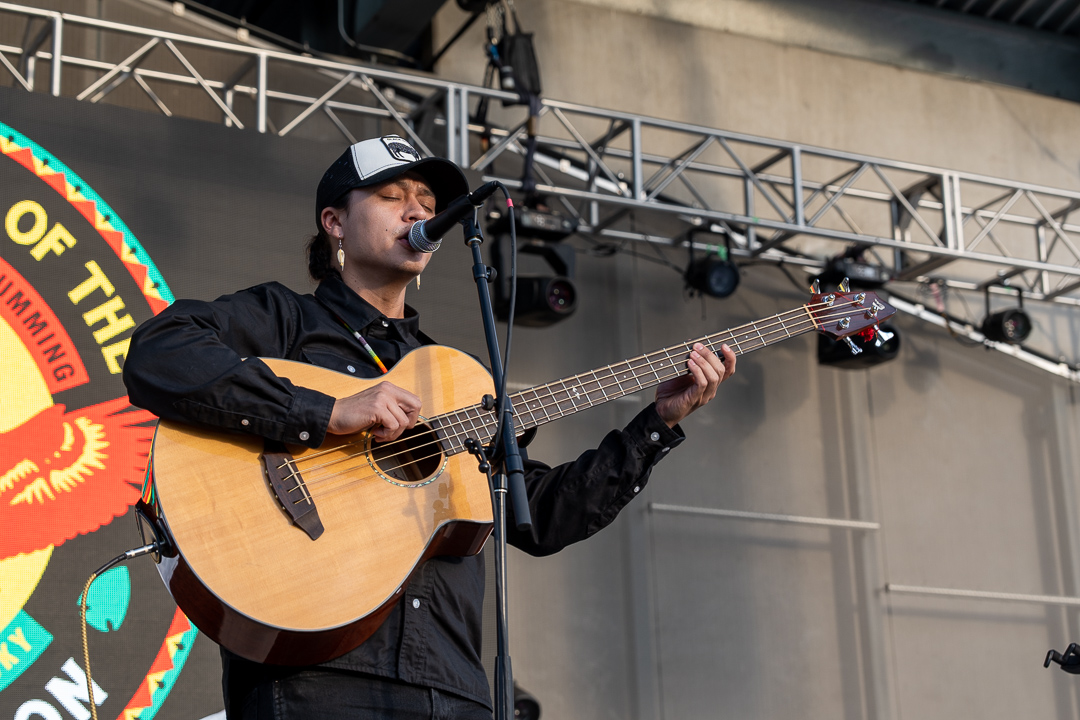
November is Native American Heritage Month, a time to honor the histories and present-day contributions of peoples who are indigenous to the land we today call the United States. From Native Americans to Alaska Natives, Native Hawaiians, and those indigenous to the U.S. Island territories, diverse Native communities throughout our country have inextricably influenced and shaped American culture and continue to do so today.
The U.S.’s Indigenous communities are ethnically, geographically, and culturally distinct, all possessing their respective heritages and traditions. Throughout the Levitt season, concerts, festivals and cultural celebrations on Levitt stages coast-to-coast aim to honor the cultural breadth of Indigenous peoples by giving a platform to Native culture bearers and curating cultural arts experiences. In recognition of Native American Heritage Month, here’s a look back at some of the Native performers and Indigenous-roots-centered events presented on Levitt stages in 2023.
First up: 2023’s first-ever Levitt AMP Clinton Music Series, presented by Scissortail Productions, energized Clinton, Oklahoma’s historic, New Deal-era McClain-Rogers Park bandshell. Reemerging as an artistic hub, the Western Oklahoma town is small but rich in cultural history, one that is inarguably shaped by its Native communities. Indeed, the land of present-day Oklahoma—which is shared by 39 sovereign Indigenous Nations (including the Kiowa, Comanche, Osage, Apache, and Fort Sill Nations)—is home to over 520,000 Indigenous residents.
Setting the mood on the Levitt AMP Clinton stage this summer was the ever-impressive Delbert Anderson Trio, led by Anderson: a critically acclaimed Diné (Navajo) jazz musician born on the Navajo Reservation, based in New Mexico, and on a mission to illuminate jazz music’s deep Indigenous roots. In July, Anderson and his bandmates jammed out at McClain-Rogers Park, wooing Clinton residents with their signature blend of Diné-inspired melodies and funk.
On a mission to bridge cultural gaps and build community through music, Levitt Pavilion Denver, located at the Colorado city’s 83-acre Ruby Hill Park, does just that through their dynamic offering of cultural programming—including free music experiences that showcase the artistic excellence of Native American performers representing an array of Indigenous communities from across the country. Relative to Colorado as a whole, Denver also has a sizeable Native population and was traditionally the land of the Ute, Cheyenne, and Arapaho Peoples. Throughout 2023, each of Levitt Denver’s free Indigenous heritage celebrations centered Native voices and were free and accessible to Denver residents of all backgrounds.
Levitt Denver’s All My Relations Celebration was a festival co-presented with the Denver Indian Center this past summer. With a unique vision of bridging cultural heritage through a contemporary lens, All My Relations (August 10) featured indie folker Samantha Crain, rapper Frank Waln, and EDM producers The Halluci Nation (hailing from Canada and members of the Six Nations, who are indigenous to modern-day Canada)—not to mention free arts experiences like live painting and an artisans’ row, food, and youth programming. Levitt Denver also showcased the raw, gritty genre that is Rez Metal—Indigenous heavy metal music, first originating from the Navajo Nation reservation. In 2023, the first-ever Rez Metal Festival held at Levitt Pavilion Denver captivated Levitt Denver audiences on June 9, featuring a lineup of Native electrifying talent representing Navajo, Pueblo, Apache, Unangax (Alaska/Aleutian Islands), and O’odham (Arizona/New Mexico) nations.
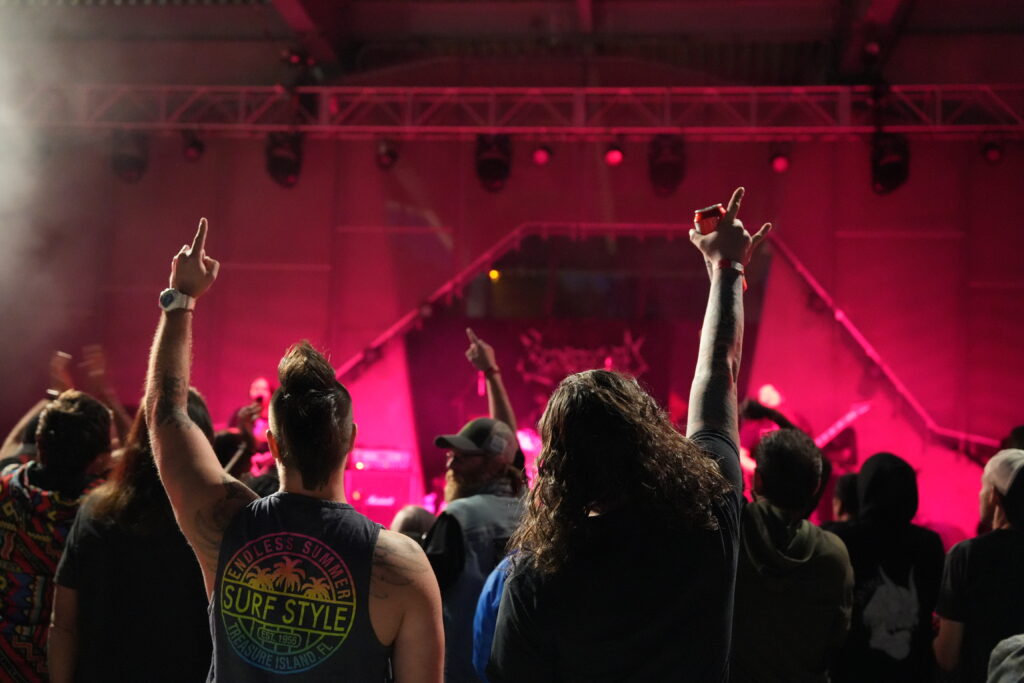
In June, Levitt Pavilion Denver’s first-ever Rez Metal Festival showcased the high-octane energy of metal music hailing from Native American reservations across the U.S.
One nationally renowned icon appearing on the Levitt stage was Samantha Crain: a multi-instrumentalist, producer, and singer-songwriter crafting folk music that warms the soul. Crain is a proud member of the Choctaw people, whose ancestral lands span both present-day Alabama and Mississippi. Enchanting Levitt audiences this summer when she graced the Levitt Denver stage in August, the Rolling Stone– and NPR-acclaimed Shawnee, Oklahoma talent’s introspective indie rock has earned her numerous awards, including three Native American Music Awards (known as “Nammys”) and one Indigenous Music Award. Also setting off the Denver stage was rapper Frank Waln (who performed on not one, but two Levitt stages this summer—both Denver and Levitt Shell Sioux Falls). Of the Sicangu Lakota peoples (a Sioux Nation band)—whose traditional lands comprise much of the Great Plains—the hip-hopper hails from South Dakota’s Rosebud Reservation and centers truth, empowerment, and healing in his art. Featuring songs like “AbOriginal” and “My People Come from the Land,” Waln’s oeuvre has earned him three Nammys.
This past summer, the Levitt AMP Gallup Music Series—taking place in New Mexico’s Gallup, home to a multifarious Native American population and tribal lands—spotlighted multiple Native artists throughout its season at Downtown Gallup’s McKinley County Courthouse Square. Presented by Gallup MainStreet Arts & Cultural District, the Levitt AMP Gallup Music Series reflected the high desert town’s cultural diversity and proximity to traditional Native lands, such as the Navajo Nation.
Back in July, Lindy Vision brought their stories once again to the Levitt AMP Gallup stage, where they mesmerized the audience with their signature amalgamation of indie rock and ‘80s-indebted synth-wave. Hailing from Albuquerque, New Mexico, Lindy Vision comprises Afro-Indigenous siblings Dorothy and Natasha Cuylear of the Jicarilla Apache Nation, whose traditional lands include present-day Colorado, Oklahoma, and New Mexico. Lindy Vision is lauded for their narrative soundscapes, which often explore generational trauma, healing, and the Black Native experience. Also in July, Def-i, an artist-poet who defies expectations, brought his fusion of hip-hop and spoken-word introspection to Levitt Gallup audiences (who also saw Def-i perform in 2022). A member of the Diné (Navajo) Nation, whose settled lands include the modern-day Four Corners states, the Albuquerque emcee’s artistry celebrates his ancestry through soulful raps—which he considers to be therapeutic for healing generational trauma.
Also coming to life in August: the dexterous blues-rock of Levi Platero (of the Eastern Agency of the Navajo Nation). Another talent returning to the Levitt AMP Gallup stage, Platero is an award-winning Navajo guitarist and singer-songwriter whose charismatic interpretation of blues music blends vintage rock with modern guitar stylings. That same month, Gallup audiences couldn’t help but cut a rug (or should we say lawn?) to Charly Lowry’s upbeat country music performance. Originating from Pembroke, North Carolina, Lowry is a singer, songwriter, instrumentalist, and activist who is equally passionate about music as she is her advocacy, which focuses on bringing justice to underserved communities and giving a voice to her ancestors amongst the Lumbee (whose traditional lands include parts of modern-day North Carolina) and Tuscarora (who lived predominantly in the Carolinas before occupation). The “Go Wild” singer is also breaking conventions within her community: Though Indigenous women were customarily barred from playing the hand drum, Lowry keeps her hand drum close to her heart, defying norms while simultaneously maintaining close ties with her Native roots.
Last, but certainly not least—when the edge of metal music collides with the drama of the violin, you get Topeka, Kansas’ Sage Haskelchi’i Cornelius, a versatile multi-instrumentalist who blew away Gallup residents of all generations and cultures as he rocked the stage of the Levitt AMP Gallup Music Series in August. The acclaimed heavy metal fiddler is of Navajo, Oneida (whose traditional lands include parts of northeast North America surrounding the Great Lakes and Ontario, Canada), Potawatomi (of the Great Plains, upper Mississippi River, and western Great Lakes area), and Kickapoo (south of the Great Lakes) ancestry.
2023 saw Indigenous artists appear on Levitt stages outside of the contiguous U.S. as well. Coming to life in the Kenai Peninsula Borough of Southcentral Alaska, the Levitt AMP Soldotna Music Series—presented by community nonprofit Vision Soldotna and injecting new energy into the riverside Soldotna Creek Park—featured local talent, including those of Native Alaskan ancestry.
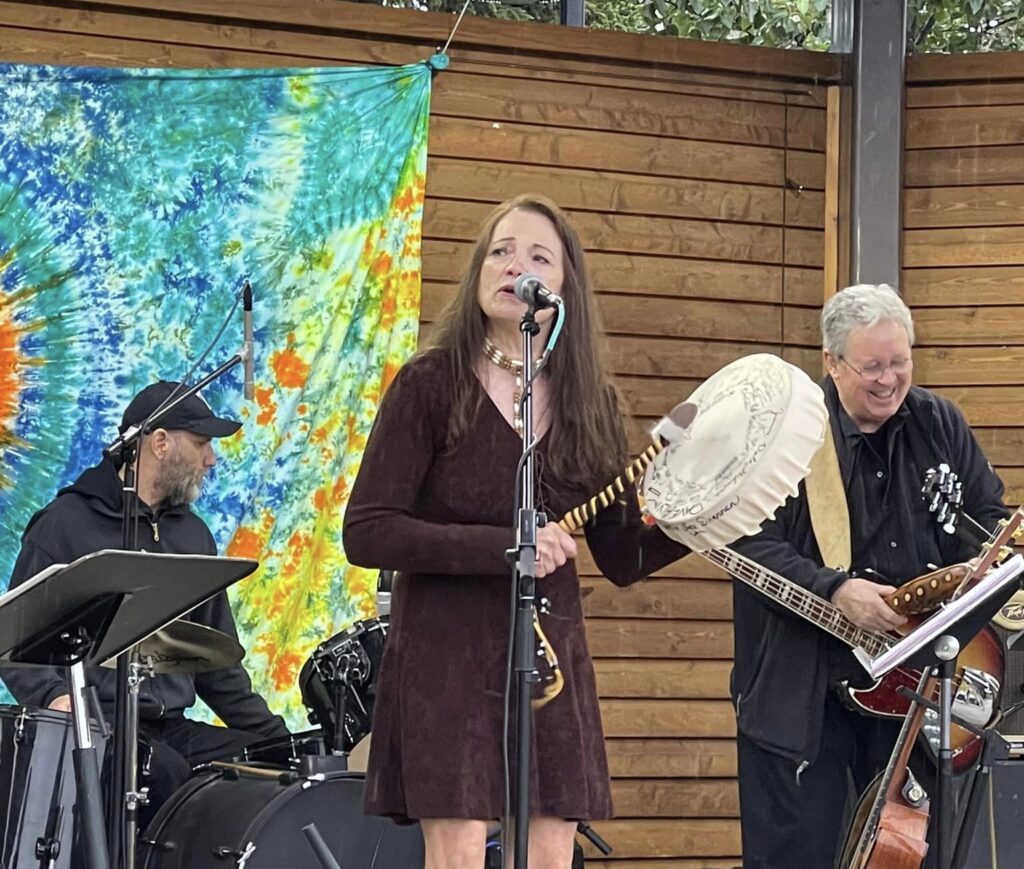
Native Alaskan Bunny Swan, who is a culture bearer of the Dena’ina Athabascan people, brought feel-good vibes to the Levitt AMP Soldotna stage in July.
One of the Kenai, Alaska area’s most beloved homegrown musicians, Bunny Swan (Dena’ina Athabascan) is a culture bearer of the Dena’ina Athabascan people—an Alaska Native band whose traditional homelands include present-day Southcentral Alaska. In July, Swan appeared on the Levitt AMP Soldotna Music Series stage this summer under the warm Alaskan sun to deliver to residents and visitors her signature blend of ancient and modern rhythms at the verdant eight-acre Soldotna Creek Park.
And on the majestic island of Maui, Hawaii, the first-ever Levitt AMP Hāna Music Series, presented by Hāna Arts and taking place on the grass lot below Hāna Ranch Restaurant, brought the joy of free, live music to the small but culturally rich community of Hāna, bridging connections between Maui locals, tourists, and the community’s Native Hawaiian population through the power of high-caliber performances put on by a plethora of Indigenous Hawaiian talents—from GRAMMY-winning and -nominated legacy superstars to the next generation of Native Hawaiian musicians celebrating their heritage through song.
Ikaakamai (Native Hawaiian) is a self-described “musical wizard,” and let the record show—any Maui resident or visitor who witnessed the musician, composer, producer, Native language scholar, and performer own the stage of the 2023 Levitt AMP Hāna Music Series this summer would surely concur. Equal parts activist and artist, Ikaakamai advocates for Indigenous youth, the valuing of Ōlelo Hawai’i (the language of Hawai’i), and justice for the Indigenous Hawaiian identity at large through feel-good Hawaiian Rēgē.
Known as “Hawai’i’s Renaissance Man,” George Kahumoku, Jr. is a Kona-born Native Hawaiian musical legend and culture bearer who brought his slack-key guitar mastery—evidenced by his four GRAMMY wins—to the Levitt AMP Hāna Music Series stage this May, warming the hearts of Hāna locals and introducing Maui tourists to the Hawaiian art of kī hōʻalu: a form of bright-sounding finger-style guitar technique born in Hawai’i. Then you have Waimānalo, Hawai’i singer-songwriter Paula Fuga, an internationally renowned pop-folk songstress and ukulele player who’s created alongside music icons like Ziggy Marley (son of Bob Marley) and Jack Johnson. A top musician in Hawai’i—with Samoan paternal ancestry and Native Hawaiian heritage on her mother’s side—the seasoned songstress created a healing atmosphere on the lawn of the Levitt AMP Hāna Music Series in September, enrapturing Hana community members with her spellbinding vocals, poetic lyricism, and gentle instrumentations.
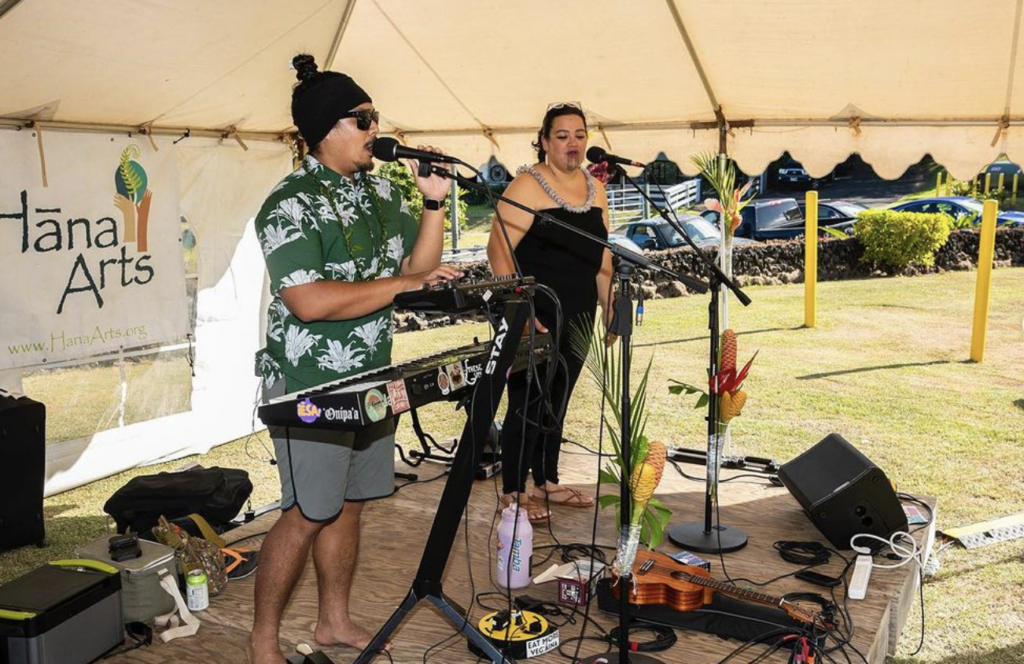
Native Hawaiian musician and activist Ikaakamai performed for Maui residents and visitors under the sun at the 2023 Levitt AMP Hāna Music Series.
The Levitt AMP Hāna Music Series stage also welcomed Maui-based recording artist, guitarist, and performer Joshua Kahula, whose roots are in Hāna. Kahula celebrates ‘ohana (Native Hawaiian language for “familial bond”) through his dynamic blend of reggae, funk, rock, R&B, and alternative. Of Indigenous Hawaiian heritage and originally rising to prominence as the lead singer and chief composer-arranger of award-winning Maui band Nuff Sedd, Kahula delighted Hāna residents and visitors this June with his lively performance at the 2023 Levitt AMP Hāna Music Series. Also, famous for bringing new life to the Hawaiian tradition of female falsetto singing, Amy Hānaialiʻi Gilliom is a six-time GRAMMY nominee who brought a sense of joy, perseverance, and healing to the greater Maui community this August during the Levitt AMP Hāna Music Series. Honoring her Native Hawaiian ancestry, Gilliom’s technical versatility (rooted in both her classical training and Indigenous cultural heritage) and “aloha spirit” have made her not just the Island’s top-selling female vocalist of all time, but also an international icon and culture bearer honoring and preserving Native Hawaiian culture on a global stage.
Back on the mainland, Native-heritage-focused programming continued at the long-running Levitt AMP Sheboygan Music Series, presented by the John Michael Kohler Arts Center and coming to life on the town’s beloved City Green. An increasingly diverse Midwestern locale of over 50,000, the lakeside city of Sheboygan sits on the central eastern side of Sheboygan County—where Indigenous peoples like the Menominees, Ho-Chunk, Ojibwe, Sacs, Foxes, Pottawatomi and others traditionally resided. Today, with help from its Levitt AMP Music Series (ongoing since 2015), Sheboygan is creating fresh opportunities for building a stronger, more connected multicultural community.
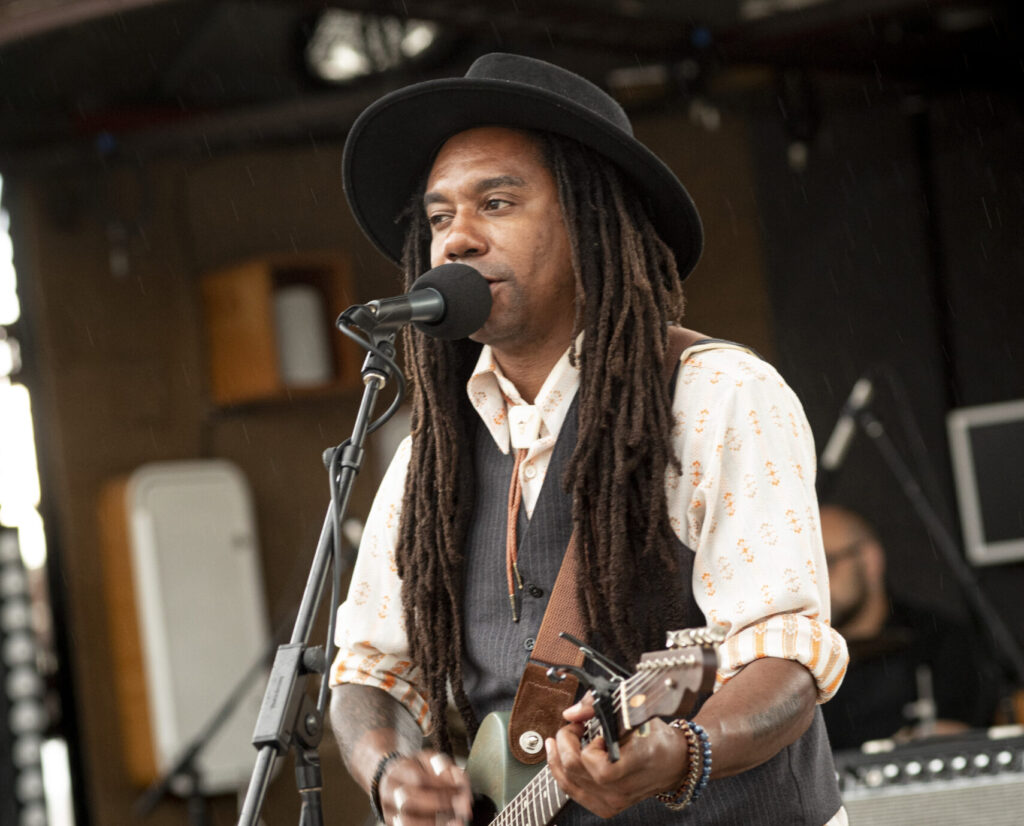
Folk artist Julian Taylor performed for a joyous audience this July on the Levitt AMP Sheboygan Music Series stage.
One of those opportunities was a thrilling performance by Afro-Indigenous singer-songwriter Julian Taylor, who dazzled Sheboygan residents and tourists this summer with his expressive take on roots music, a genre established by Native and Black Americans. Taylor, who is Canadian and of Mohawk—a group of Native people indigenous to North America, with communities in both Canada and New York—descent is a five-time Nammy nominee and frequently pulls inspiration from his ancestral lineage, which traces back to the First Nations reserve of Quebec’s Kahnawake. Audiences swayed to the soft sounds of Taylor’s soulful folk and rock catalog this July.
Serving a greater South Dakotan community comprising nearly 9 percent Native American residents, Levitt Shell Sioux Falls is an inclusive space for folks of all backgrounds to celebrate Native arts and culture while giving Indigenous residents themselves an opportunity to reclaim joy through the power of free arts and music experiences centering the Native identity. Summer 2023 saw Levitt Shell Sioux Falls (located in Sioux Falls on traditional Yankton Sioux land) celebrate a breadth of Indigenous communities through both regular programming and multi-day cultural events, such as the All My Relatives/Mitakuye Owas’iƞ/Mitákuye Oyás’iŋ Festival that set off the Sioux Falls stage July 7 and 8. The free festival celebrates Native American musicians, art, and culture and featured joy-oriented activities like a fashion show, STEM and arts youth activities, a vendors’ row, dance performances from Lumhe and Samsoche Sampson (of the Seneca and Muscogee Creek peoples), and free Levitt concerts featuring numerous award-winning Indigenous artists.
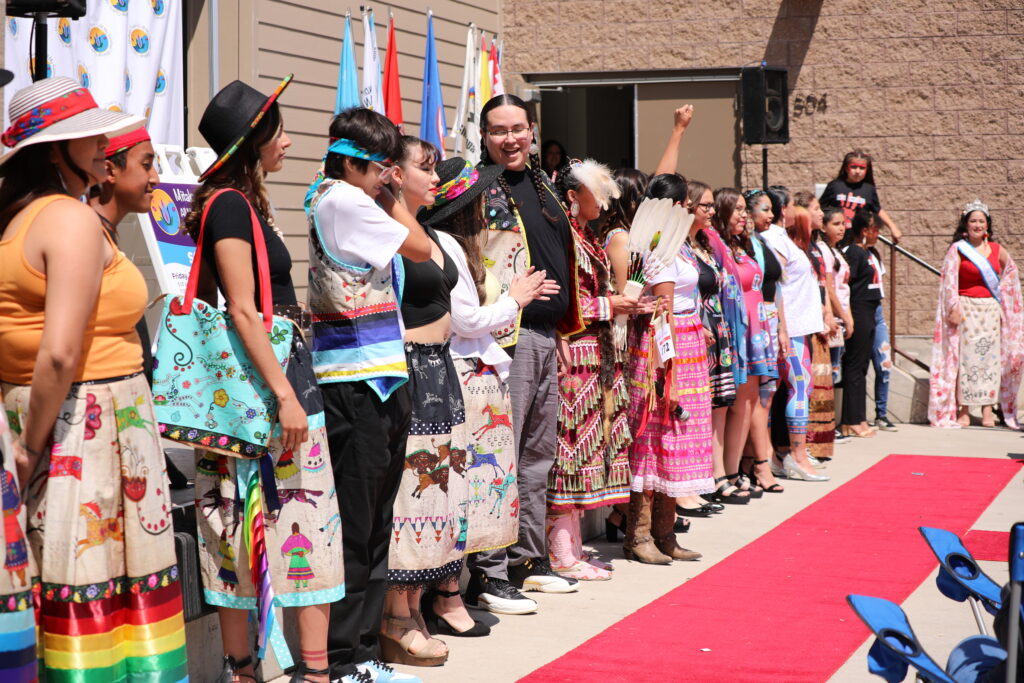
Celebrating multiple forms of Indigenous arts, Levitt Shell Sioux Falls’ All My Relatives/Mitakuye Owas’iƞ/Mitákuye Oyás’iŋ Festival featured numerous joy-inspiring activities, like a runway show showcasing colorful Native fashions.
Levitt Sioux Falls audiences got down to melodic, slice-of-life raps by Lakota Sioux performer and producer Gabriel Night Shield, whose reflective hip-hop bars have landed him three Nammys and an Indian Summer Music Award—making him a respected performer on the Rosebud Sioux Reservation, located in south central South Dakota, and amongst Midwest audiences farther afield, too. The music rolled on with guitarist and singer-songwriter Kobe Jordan, who makes diaristic pop music from the soul. Hailing from Vermillion, South Dakota, and a member of the Yankton Sioux Tribe, Jordan brought his emotive artistic practice to the stage of Levitt Shell Sioux Falls this July, fostering a sense of empathy and joy amongst Levitt audiences through his modern-pop-meets-‘80s-synthwave repertoire. Setting out to craft songs that evoke familiar emotions, Jordan dazzled Sioux Falls community members of all walks of life with his upbeat, guitar-driven tunes.
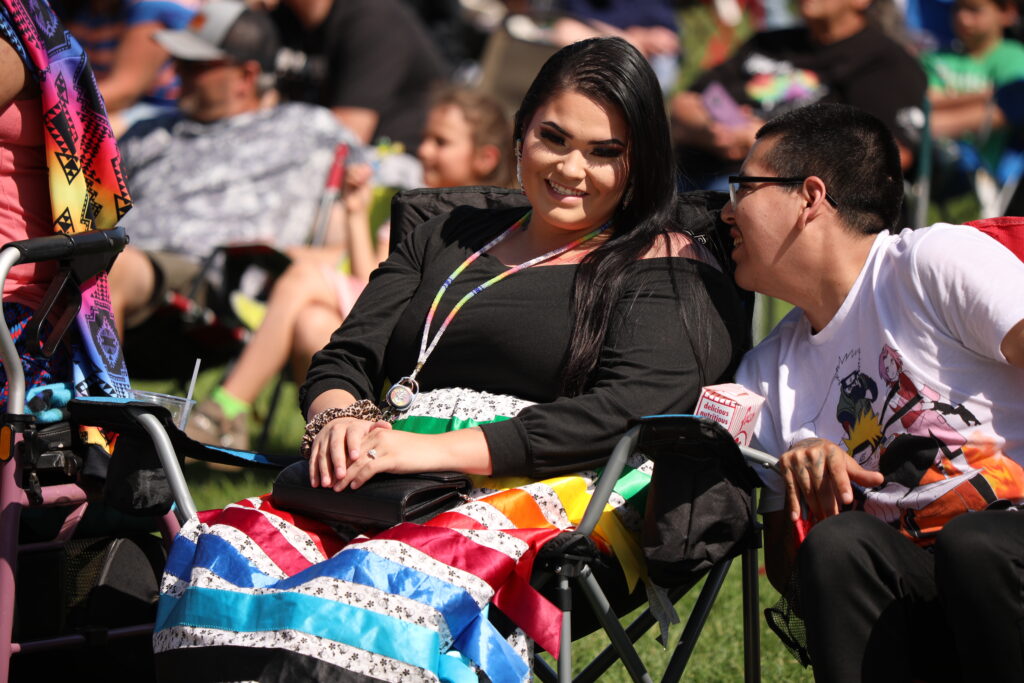
Serving a South Dakotan community comprising nearly 9 percent Native American residents, Levitt Shell Sioux Falls is an inclusive space for people of all walks of life to celebrate Native arts and culture.
Balancing out rising stars like Waln and Jordan were veteran music stars, too. Something of an Americana legend, Mato Nanji (of blues-rock family band Indigenous) needs little introduction amongst blues lovers, though his guitar shredding and expressive baritone have never ceased to impress any music fan—including Levitt at the Falls audiences this July. Born and raised on South Dakota’s Yankton Sioux Reservation, Nanji is of the Nakota Nation (whose traditional lands include large swaths of the U.S. and Canada) and continues the art-activism legacy of his father, Greg Zephier, who was a Native rights activist and seasoned musician. Some of Indigenous’s most recent work honors and explores the lived experiences of Indigenous youth, particularly those raised on reservations.
This year’s Native American Heritage Month might be winding down, but Levitt stages across the country honor and celebrate the culture and traditions of Native and Indigenous communities all year round. Keep up with your go-to Levitt venue or Levitt AMP Music Series site for next year’s season lineups.
